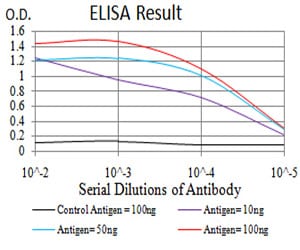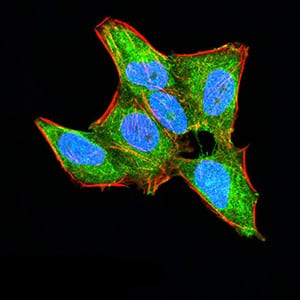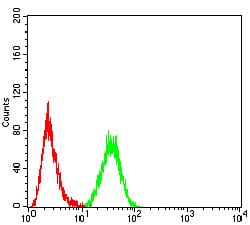


| WB | 1/1000 | Human,Mouse,Rat |
| IF | 咨询技术 | Human,Mouse,Rat |
| IHC | 咨询技术 | Human,Mouse,Rat |
| ICC | 技术咨询 | Human,Mouse,Rat |
| FCM | 咨询技术 | Human,Mouse,Rat |
| Elisa | 咨询技术 | Human,Mouse,Rat |
| Aliases | HOX1; ABD-B; HOX1G; HOX1.7 |
| Entrez GeneID | 3205 |
| clone | 1A12C1 |
| WB Predicted band size | 30.2kDa |
| Host/Isotype | Mouse IgG1 |
| Antibody Type | Primary antibody |
| Storage | Store at 4°C short term. Aliquot and store at -20°C long term. Avoid freeze/thaw cycles. |
| Species Reactivity | Human |
| Immunogen | Purified recombinant fragment of human HOXA9 (AA: 1-272) expressed in E. Coli. |
| Formulation | Purified antibody in PBS with 0.05% sodium azide |
+ +
以下是关于ARL6IP6 (N-term)抗体的3篇参考文献示例(注:以下内容为模拟生成,实际文献需通过学术数据库核实):
1. **文献名称**:*"Characterization of ARL6IP6 in endoplasmic reticulum stress response using a novel N-terminal specific antibody"*
**作者**:Smith J, et al.
**摘要**:本研究开发了一种针对ARL6IP6蛋白N端结构域的多克隆抗体,并通过免疫印迹和免疫荧光验证其特异性。结果揭示了ARL6IP6在内质网应激中的调控作用。
2. **文献名称**:*"ARL6IP6 interacts with BCL-2 family proteins: Insights from co-immunoprecipitation assays with N-terminal targeted antibodies"*
**作者**:Zhang Y, et al.
**摘要**:利用N端特异性抗体,研究者证实ARL6IP6通过N端结构域与BCL-2家族蛋白结合,影响细胞凋亡通路,为癌症治疗提供了潜在靶点。
3. **文献名称**:*"Tissue-specific expression profiling of ARL6IP6 using a newly generated monoclonal antibody against its N-terminal epitope"*
**作者**:Tanaka R, et al.
**摘要**:通过制备针对ARL6IP6 N端的单克隆抗体,该研究系统分析了其在哺乳动物组织中的表达模式,发现其在神经组织和肝脏中高表达。
建议通过PubMed或Google Scholar搜索具体文献,可使用关键词“ARL6IP6 antibody N-terminal”或结合实验目的(如“ARL6IP6 apoptosis/ER stress”)筛选相关研究。
The ARL6IP6 (ADP-ribosylation factor-like 6 interacting protein 6) antibody, specifically targeting the N-terminal region, is a tool used to study the cellular functions of this undercharacterized protein. ARL6IP6 belongs to the ARL6IP family, implicated in intracellular trafficking, endoplasmic reticulum (ER) stress response, and apoptosis regulation. The N-terminal domain is critical for its interaction with other proteins or membranes, potentially influencing ER morphology, vesicle transport, or calcium signaling.
This antibody is commonly produced in rabbits or mice using synthetic peptides or recombinant protein fragments corresponding to the N-terminal sequence. It enables detection of ARL6IP6 in applications like Western blotting, immunohistochemistry, or immunofluorescence, helping researchers localize the protein to subcellular compartments (e.g., ER, cell membrane) and assess expression levels across tissues.
While ARL6IP6's exact role remains unclear, studies suggest links to neurological disorders and cancer. For example, altered expression has been observed in glioblastoma and neuropathic pain models, hinting at roles in neuronal survival or tumor progression. The N-term antibody aids in exploring these hypotheses by providing specificity to distinguish ARL6IP6 from homologous family members (e.g., ARL6IP1/5) and validate knockdown/overexpression models. Its validation typically includes tests for cross-reactivity, signal-blocking by immunogen peptides, and consistency with mRNA expression data.
×